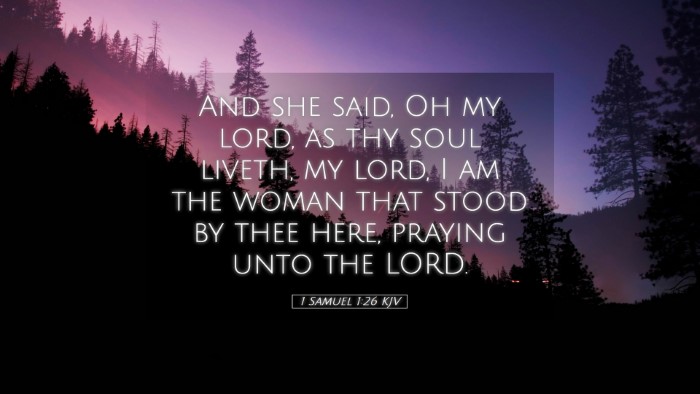Commentary on 1 Samuel 1:26
Bible Verse: "And she said, O my lord, as thy soul liveth, my lord, I am the woman that stood by thee here, praying unto the LORD."
Introduction
The narrative surrounding 1 Samuel 1:26 is rich with theological significance and personal devotion. This verse occurs in the context of Hannah's earnest prayer for a son and her subsequent dedication of Samuel to the Lord. The insights derived from this moment not only reveal Hannah's profound faith but also initiate the unfolding of God's redemptive plan through her child.
The Context of Hannah's Prayer
Hannah, one of the wives of Elkanah, faced deep anguish due to her inability to bear children. This social stigma weighed heavily on her, fostering an environment of desperation and prayer. Public domain commentaries provide valuable insights into the cultural and spiritual climate in which this narrative unfolds.
-
Matthew Henry emphasizes Hannah's humble spirit and her sincere commitment to God as she pours out her soul in anguish. This highlights the importance of an authentic relationship with God in times of distress.
-
Albert Barnes notes that Hannah's prayer was not merely for personal fulfillment but was deeply intertwined with the welfare of Israel, as she sought a child who would serve the Lord. This connects her personal desires with national needs.
-
Adam Clarke points out that Hannah’s actions demonstrate her faith that God would answer her prayers, which was significant given the societal pressures she faced.
Hannah's Encounter with Eli
Verse 26 reflects an important moment of recognition and affirmation for Hannah when Eli the priest acknowledges her. The approach that Hannah takes, saying, "O my lord, as thy soul liveth," encapsulates her respect for Eli's position and underscores her commitment to her vow to God.
-
Matthew Henry remarks that Hannah's address reflects a deep-rooted reverence not only for Eli but also for God's ordained authority within the Israelite community.
-
Albert Barnes expands on the significance of her introduction, suggesting that it encapsulates her journey from reproach to recognition, signifying God's intervention in her life.
The Significance of "Praying unto the LORD"
The phrase "praying unto the LORD" signifies Hannah’s personal relationship with God. At this pivotal moment, she asserts her identity as the woman who fervently prayed, showcasing her faith against societal constraints.
-
Adam Clarke emphasizes the transformative power of prayer, suggesting that Hannah’s dedication to prayer not only impacted her life but also altered the course of Israel’s history through Samuel.
-
Matthew Henry notes that in her heartfelt supplication, Hannah exemplifies the characteristics of humble prayer: sincerity, persistence, and faith, which are essential for all believers.
Theological Insights
This verse exemplifies several profound theological themes that resonate throughout Scripture:
- Divine Providence: Hannah's story is a narrative of God’s providential care, illustrating how He works through the circumstances of human life to fulfill His purposes.
- Faith and Sacrifice: Hannah’s willingness to dedicate her child to the Lord demonstrates the theme of sacrificial love and the importance of recognizing God’s sovereignty in our lives.
- God’s Faithfulness: Hannah's journey reassures believers of God's faithfulness, as she experienced answered prayer in the gift of a child, underscoring the theme of hope intrinsic to faith.
Conclusion
1 Samuel 1:26 stands as a pivotal moment in the narrative of God’s unfolding story, demonstrating the power of prayer and the importance of personal devotion. The insights from public domain commentaries collectively portray Hannah as a model of faith. Her story calls upon pastors, students, theologians, and scholars to reflect on the nature of prayer, the significance of personal piety, and the overarching providence of God in human affairs. Through Hannah’s dedication of Samuel, we see the intersection of individual need, communal responsibility, and divine purpose, setting the stage for significant future developments in the history of Israel.


